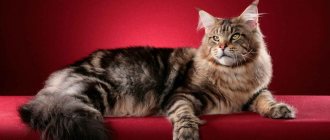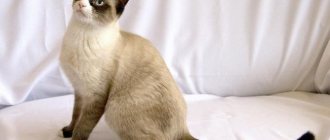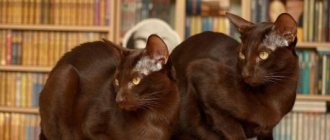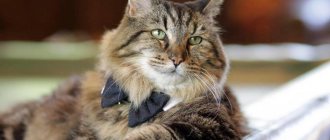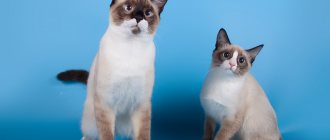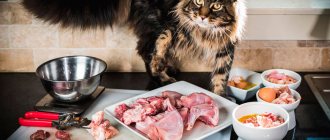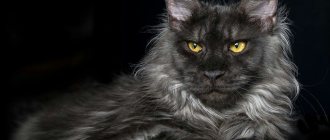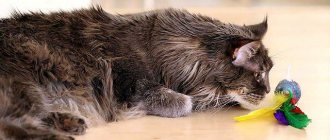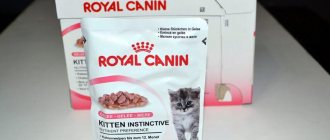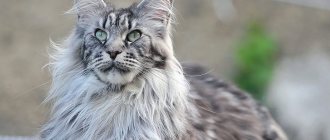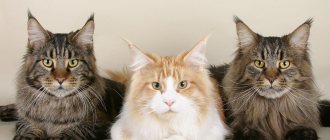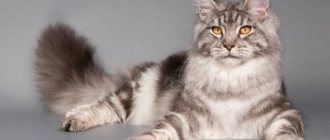Update date: 02/14/2021 14:36:52 28490 Share:
Author of the article: Astafieva Ekaterina Alekseevna
*Review of the best according to the editors of simplerule.ru. About the selection criteria. This material is subjective in nature, does not constitute advertising and does not serve as a purchase guide. Before purchasing, consultation with a specialist is required.
Anyone who has had the chance to meet this unique cat breed of “good giants” will remain forever in love with it and admired by the beauty, strength, proud grandeur and incredible playfulness of the Maine Coon. How to properly feed such a pet? What foods should you pay attention to? We will answer all questions.
Allowed products for Maine Coon
It is extremely difficult for an inexperienced owner to independently balance the diet of his four-legged pet.
In this case, it is best to contact a veterinarian, who, after examining the animal, will be able to select the right nutrition. In addition, it is worth considering that if the Maine Coon eats only natural food, then adding vitamins is mandatory. The most favorable foods for the Maine Coon are presented below. From these you can make up your pet’s daily diet:
- Meat - beef, young rabbit, as well as turkey and lean chicken.
- Meat products - chicken hearts and stomachs, beef tripe, pork heart. You can give beef and/or chicken liver, but only boiled, as raw liver can cause diarrhea. Maine Coons also love chicken necks, paws and heads (without beaks), pig snouts and cockscombs. Once every 7-10 days you can give small pieces of beef udder or beef kidneys (pre-soaked in cold water).
- Fish - it’s better not to get carried away with it, as it can wash vitamins out of a cat’s bones. You can give any sea fish once a month, but only boiled.
- Vegetables - pumpkin, zucchini, beets in limited quantities, carrots, broccoli or cauliflower.
- Eggs - can be given 1-2 times a week. Chicken without protein, quail with protein.
- Fermented milk products - low-fat sour cream, kefir, natural yogurt without additives, curdled milk, fermented baked milk.
- You should definitely add kelp to your Maine Coon's diet. It is a good source of iodine and has a beneficial effect on the thyroid gland.
- Cheese and cottage cheese - these products can be given daily. Cottage cheese should be low-fat, and cheese should be better than hard varieties, and also with a minimum percentage of fat content.
- As for fats, it is better to give preference to olive oil. You can season boiled vegetables with it or add 1/3 teaspoon to a serving of meat once a day.
- To improve digestion, you need to give wheat bran daily. The most convenient way is to chop them and sprinkle a portion of the meat mixture.
It is best to feed your pet 3 times a day - cottage cheese or fermented milk products in the morning. For lunch, give, for example, a mixture of chicken gizzards, some finely chopped beef tripe and meat with vegetables. In the evening, just one thing - chicken heads, necks, pork penny or other offal. Vitamins must be added every day to lunch, in the proportions indicated on the package.
Ready-made food for Maine Coons
Feeding Maine Coons with ready-made industrial food is quite convenient and quick: it can be stored for a long time, thereby saving your time on cooking.
Today, there are a huge number of special series of dry and wet food for Maine Coon kittens and adult cats of large breeds. You can choose it depending on the preferences of your pet. In addition, there are foods that are produced specifically to maintain the health of baleen cats, for example, during pregnancy, lactation, or focused on the health of the urolithiasis system, cats suffering from obesity, and so on.
Maine Coons are highly discouraged from eating low quality food, such as Whiskas and KittyKat. Constantly feeding cheap food can lead to a whole bunch of serious diseases that will cause problems for you and your pet. It is recommended to choose professional premium food from the following: Hills, Nutro. Veterinarians and owners of giant cats often leave only positive reviews about these foods.
Remember that the best food for your Maine Coon will be the one prescribed by your veterinarian. Wet food is considered healthier and more nutritious, but its prices differ significantly from the prices of dry food. Here the choice is up to the owner, naturally, based on his own capabilities. Alternatively, you can feed your cat dry food in the morning and canned food in the afternoon or evening.
Feeding cats dry food
Dry food is a normal balanced diet for Maine Coons. Long-term feeding with high-quality dry food completely rebuilds the pet’s body to produce the necessary digestive juice so that metabolism and water-salt balance are carried out correctly.
Many owners mistakenly assume that dry food forms stones in the animal's urinary tract. However, if you provide your Maine Coon with proper nutrition in accordance with its weight, no health problems will arise.
All dry food is divided into 4 classes:
- Holistic. Healthy professional food. A combination of balance and nutrition.
- Super premium. Ideally balanced professional food. The best dry food for Maine Coon, judging by the reviews of most owners.
- Premium Healthy food for your pet.
- Economy Cheap food that can lead to weight loss, watery eyes, deterioration of the coat, and so on.
Which one to feed the Manx raccoon cat is up to the owner, since the main thing for the animal is that it is tasty.
Wet food for Maine Coons
Wet food is practically no different in composition from dry food. However, at pet markets they are divided into complete diets and treats. Wet food is made in the form of pates and jellies, each of which can also be economy or premium class. As a rule, Maine Coons love to eat wet food.
Premium food
As we have already said, the food that your Manx cat will eat should be super premium or premium, that is, high quality. The list of its ingredients should first of all include a certain type of meat, as well as minerals and fats.
Premium dry and wet food for Maine Coons is produced by Royal Canin, Hills, Eukanuba, Nutro, EaglePack, PurinaProPlan.
By the way, Royal Canin and Hills are often classified as super premium, since they have their own line of medicinal foods, and the quality is significantly different from other premium brands.
How to choose the best option
A native of the Northeast of America, an excellent rodent hunter, a giant among cats, the Maine Coon differs from most cat breeds not only in size, but also in appearance, and even disposition. A very strong, hardy, active breed requires appropriate living conditions and diet in particular.
The first thing to consider is the parameters of the animal. This is important for correctly calculating calorie intake. Overeating or undereating is a serious problem for the Maine Coon. For a medium-sized individual, 250 g of food per day can be considered the norm. If the animal is in the growing stage, this number should be doubled.
An ideally balanced composition for a large breed is as follows (in 100 g):
- Proteins – 40%;
- Fats – 10-30%;
- Fiber – >2%.
The main requirement for Maine Coon food is at least super-premium class. The first place in the composition indicated on the package should be meat. But cereal components or corn are undesirable - they can lead to obesity in your pet or cause allergies.
A mixed type of diet is suitable for a growing individual: be sure to include dry food, premium canned food and natural products in the diet. However, food should not be freely available around the clock. A castrated or sterilized individual must choose food very carefully - the content of magnesium and phosphorus should be reduced.
Feeding castrated animals
Most animals show a more active appetite after surgery. This is due to changes in hormonal levels. The owner needs to closely monitor the weight, activity and general behavior of the neutered Maine Coon. As soon as the cat becomes passive, refuses to go for walks, or begins to breathe heavily after slight physical exertion, it means that its weight has exceeded the permissible limits. In this case, the portion is reduced and 2-3 fasting fasting days per month are prescribed.
Castrated cats are prone to manifestations of urolithiasis - a special series of industrial feeds is intended for them.
It is not recommended to give fish to castrated cats.
Proper nutrition of the Maine Coon is the key to its good health and guarantees that the pet will reach old age. And some of the difficulties in preparing natural food or the financial costs of high-quality industrial mixtures are more than compensated for by years of long and strong friendship between the owner and his giant pet.
I like1I don't like
Reviews of Royal Canin for kittens
Natalya: “Our veterinarian praises Royal Canin Kitten 34 food, although I also read negative reviews from veterinarians on the Internet. Of course, super-premium and holistic foods are of much higher quality, but they are priced accordingly and not everyone can afford them. I decided to watch my kitten, if there is a negative reaction, I will have to fork out for more expensive brands. So far everything is fine - active, normal bowel movements, good appetite.”
Nikolai: “Our Siamese beauty gave birth to four wonderful kittens. We give her Royal Canin Mother & Babycat throughout her pregnancy and after birth. The cat looks healthy, all kittens have enough milk. Now the babies are already 4 months old and they are trying to eat from their mother’s bowl.”
Natural nutrition
Preparing food for your Maine Coon yourself is considered a very good way to raise a healthy and large cat, but it has 2 disadvantages: it is time-consuming and requires careful consideration of nutrients. But feeding Maine Coon kittens traditionally occurs in this way - the owners develop a balanced menu and carefully monitor the quality of the products.
Meat and offal in the Maine Coon diet
Maine Coon food should contain up to 95% protein. In nature, the cat leads a predatory lifestyle and has not yet become an omnivore. For full development, it needs animal (and not plant) protein, the main supplier of which is meat.
During the first 2 months, owners and breeders do not face the question of what to feed the Maine Coon. During this period, the kitten has enough mother's milk. But as soon as he switches to independent feeding, the need immediately arises to provide him with protein of animal origin:
- The best meat varieties for cats are lean beef, rabbit, chicken, and turkey.
- By-products - kidneys, liver, heart, and other offal also contain the necessary types of proteins and should be present in the Maine Coon's diet.
It is advisable to clean all meat components from bones, films, fatty layers, and tendons. Before feeding the cat, the meat is completely frozen. To do this, the product is placed in the freezer for 3-5 days, and then thawed and given to the Maine Coon raw, boiled or doused with boiling water. This preparation algorithm guarantees the death of all parasites that can infect the intestinal microflora and cause negative consequences for the cat’s health. The same applies to all types of by-products, which must be subjected to complete heat treatment.
Fish and fish products
The second source of animal protein for the Maine Coon is fish. However, the presence of fish ingredients in natural diets is controversial. You cannot completely deprive the Maine Coon of this nutritional component, since in nature the cat catches fish on its own. Experts recommend following the following rules:
- At home, Maine Coons receive dishes containing fish no more than 2 times a week.
- Fish dishes should not be separate - the product is offered to the Maine Coon along with vegetables or cereals.
- Large and small bones are removed.
- Cod, pollock, sprat, herring (other cheap varieties) have little nutritional value, but urolithiasis and other related cat ailments develop from their consumption. Therefore, it is not recommended to feed them to a Maine Coon kitten (from 3 months to six months).
- Salted fish should be completely excluded from the diet.
Despite all the prohibitions and restrictions, fish is considered an extremely valuable product in the Maine Coon’s natural diet. In addition to protein, it supplies the body with fats, vitamins and microelements.
Can Maine Coons have milk and eggs?
A chicken egg must be present in a cat’s diet, but it must be given once a week. It is preferable to feed the animal only the yolk. It contains the element biotin (vitamin B), which is extremely valuable for metabolism. A one-time weekly intake of this component is enough to maintain the desired balance of substances in the body, regardless of how many times a day the Maine Coon eats and what the size of its portions.
It is believed that all cats love milk, but its role in natural nutrition should not be overestimated:
- You can feed a Maine Coon kitten with whole cow's milk for no more than 3-4 months, after which this product is no longer absorbed by the body.
- Goat's milk is great for both large and small cats - you can give chicken protein along with it.
- Fermented milk products work great in a natural menu: sour cream, yogurt, kefir, yogurt, cheese, cottage cheese (low fat content).
All dairy products are used in pure form or mixed with other ingredients. They belong to the section of regular food that you can feed your Maine Coon.
Vegetables, grains and fruits
In order for the Maine Coon to be healthy, a variety of vegetables and fruits must be included in its natural diet. In the natural environment, cats do not receive these products and therefore they are most often included in the menu as part of other dishes. Vegetables, raw or boiled, are chopped (grated) and added to meat and fish. And fruits are most often combined with dairy products.
The picture is the same with cereals. They are fed to the Maine Coon to gain weight and further maintain good physical shape. Oatmeal is steamed, rice and buckwheat are boiled, mixed with meat or fish in a 1:2 ratio and offered to the cat 3-4 times a week. A large cat will not be interested in porridge as a separate dish; Maine Coons are quite loyal to combined food.
Wellness® Indoor Health for Adult Cats
Wellness cat food is an American-made product new to Russian shelves.
Ingredients: salmon 26% (fresh meat 16%, fish meal 10%), dried potatoes, peas, potato protein, herring (fish meal) 8%, tuna (fish meal) 5%, flaxseed, dried beets 3%, fiber , rapeseed oil, salmon oil 2%, dried fish protein 2%, dried chicory root 0.5%, glucosamine hydrochloride 300 mg/kg, chondroitin sulfate 200 mg/kg, cranberry, dried kelp, Yucca Schidigera
Pros: #1 ingredient and protein source - fresh meat and fish. The food formula does not contain artificial preservatives or antioxidants. Grain-free composition. Enriched with vitamins and minerals. The line contains diets for every stage of life. High protein content, very suitable for pregnant cats. Nice packaging design.
Cons: the food is sold only in online stores and some pet stores. Quite a high cost. There is no medicinal food in the line. Contains cellulose - an undesirable component. Inconsistency of compositions in Russia and the USA - everyone knows how suppliers like to embellish the compositions of feed. Salmon feed contains rapeseed oil, which may contain a toxic substance.
Ready-made food for Maine Coons
Feeding Maine Coons with ready-made industrial food is quite convenient and quick: it can be stored for a long time, thereby saving your time on cooking.
Today, there are a huge number of special series of dry and wet food for Maine Coon kittens and adult cats of large breeds. You can choose it depending on the preferences of your pet. In addition, there are foods that are produced specifically to maintain the health of baleen cats, for example, during pregnancy, lactation, or focused on the health of the urolithiasis system, cats suffering from obesity, and so on.
Maine Coons are highly discouraged from eating low quality food, such as Whiskas and KittyKat. Constantly feeding cheap food can lead to a whole bunch of serious diseases that will cause problems for you and your pet. It is recommended to choose professional premium food from the following: Hills, Nutro. Veterinarians and owners of giant cats often leave only positive reviews about these foods.
Hills feed
Royal Canin food
Nutro food
Remember that the best food for your Maine Coon will be the one prescribed by your veterinarian. Wet food is considered healthier and more nutritious, but its prices differ significantly from the prices of dry food. Here the choice is up to the owner, naturally, based on his own capabilities. Alternatively, you can feed your cat dry food in the morning and canned food in the afternoon or evening.
Feeding cats dry food
Dry food is a normal balanced diet for Maine Coons. Long-term feeding with high-quality dry food completely rebuilds the pet’s body to produce the necessary digestive juice so that metabolism and water-salt balance are carried out correctly.
Many owners mistakenly assume that dry food forms stones in the animal's urinary tract. However, if you provide your Maine Coon with proper nutrition in accordance with its weight, no health problems will arise.
All dry food is divided into 4 classes:
- Holistic. Healthy professional food. A combination of balance and nutrition.
- Super premium. Ideally balanced professional food. The best dry food for Maine Coon, judging by the reviews of most owners.
- Premium Healthy food for your pet.
- Economy Cheap food that can lead to weight loss, watery eyes, deterioration of the coat, and so on.
Which one to feed the Manx raccoon cat is up to the owner, since the main thing for the animal is that it is tasty.
Wet food for Maine Coons
Wet food is practically no different in composition from dry food. However, at pet markets they are divided into complete diets and treats. Wet food is made in the form of pates and jellies, each of which can also be economy or premium class. As a rule, Maine Coons love to eat wet food.
Premium food
As we have already said, the food that your Manx cat will eat should be super premium or premium, that is, high quality. The list of its ingredients should first of all include a certain type of meat, as well as minerals and fats.
Premium dry and wet food for Maine Coons is produced by Royal Canin, Hills, Eukanuba, Nutro, EaglePack, PurinaProPlan.
By the way, Royal Canin and Hills are often classified as super premium, since they have their own line of medicinal foods, and the quality is significantly different from other premium brands.
Compound
The composition of Royal Canin Kitten food was developed according to the recommendations of felinologists and veterinarians.
Ingredients
- dehydrated poultry meat
- yeast
- fish fat
- corn
- rice
- vegetable fiber
- animal fats
- soybean oil
- fructooligosaccharides
- Plant protein isolate (specially selected proteins for maximum absorption)
- beet pulp
- animal protein hydrolysate
- minerals
- plantain husk and seeds
- borage oil
- Marigold erecta extract (source of lutein)
- yeast hydrolyzate (source of mannan oligosaccharides)
- hydrolyzed cartilage (source of chondroitin)
- hydrolyzate from crustacean shells (source of glucosamine)
Nutritional supplements (per 1 kg of feed)
- Vitamin A – 27600 IU
- Vitamin D – 800 IU
- Iodine – 3.2 mg
- Iron – 38 mg
- Manganese – 52 mg
- Selenium – 0.1 mg
- Copper – 5 mg
- Zinc – 180 mg
- Preservatives
- Antioxidants
Nutrients of Royal Canin Kitten Maine Coon 36
| Nutrients | Unit | Quantity |
| Squirrels | % | 36 |
| Minerals | % | 7,4 |
| Starch | % | 20,1 |
| Fats | % | 23 |
| Vitamin B2 (riboflavin) | mg/kg | 47,3 |
| Biotin | mg/kg | 2,99 |
| Arachidonic acid | % | 0,11 |
| Alimentary fiber | % | 8,10 |
| Calcium | % | 1,15 |
| Vitamin A | IU/kg | 31 000 |
| L-carnitine | mg/kg | 50 |
| Total fiber | % | 4,8 |
| Vitamin B3 (niacin) | mg/kg | 522 |
| Omega 3 fatty acids | % | 0,99 |
| Vitamin C | mg/kg | 300 |
| Linoleic acid | % | 4,87 |
| Glucosamine+chondroitin | mg/kg | 500 |
| Vitamin B5 (pantothenic acid) | mg/kg | 141,5 |
| Omega 6 fatty acids | % | 5,15 |
| Metabolic Energy NRC 85 (Atwater) | kcal/kg | 4 100 |
| Vitamin E | mg/kg | 600 |
| Phosphorus | % | 1,05 |
| EPA/DHA acids | % | 0,41 |
| Metabolic energy (measured) | kcal/kg | 4 285 |
| Kholin | mg/kg | 2 500 |
| Vitamin B1 (thiamine) | mg/kg | 27,3 |
| Potassium | % | 0,7 |
| Folic acid | mg/kg | 13,7 |
| Selenium | mg/kg | 0,37 |
| Iodine | mg/kg | 4,6 |
| Vitamin B6 (pyridoxine) | mg/kg | 73,9 |
| Taurine | %G | 0,28 |
| Copper | mg/kg | 15 |
| Iron | mg/kg | 233 |
| Zinc | mg/kg | 187 |
| Vitamin B12 (cyanocobalamin) | mg/kg | 0,14 |
| Magnesium | % | 0,08 |
| Vitamin D3 | IU/kg | 800 |
| Sodium | % | 0,6 |
| Manganese | mg/kg | 65 |
| Arginine | % | 2,01 |
| Glucosamino chloride | mg/kg | 496 |
| L-lysine | % | 1,45 |
| Lutein | mg/kg | 5,6 |
| Nitrogen-free extractives | % | 25,3 |
| DL-metnonine | % | 1,14 |
| Metnonin+cystine | % | 1,69 |
| Humidity | % | 5,5 |
Nutritional features depending on the circumstances
When preparing a diet for your pet, the following factors should be taken into account:
- age of the animal;
- health status;
- history of sterilization (castration) operations;
- for cats – bearing and feeding offspring.
Age factor
The composition and quantity of feed, diet must be adjusted in accordance with age needs. A growing organism needs “building” material, the source of which is food and vitamin and mineral supplements.
Up to 4 months, a Maine Coon kitten should be fed small portions 5-6 times a day. Gradually, the number of feedings decreases and by 12 months the growing baby switches to 2 meals a day.
By this time, the composition of the feed should also change. A mature body does not experience the same needs as during the period of growth.
Therefore, you should not offer a mature cat food intended for kittens, and babies should not be fed “adult” food.
Nutrition during illness
Despite the fact that representatives of the breed are distinguished by their strong physique and endurance, they may experience health problems due to unfortunate heredity.
The table shows diseases characteristic of the Maine Coon breed:
| Disease | Recommendations for treatment and prevention |
| Urolithiasis disease | To prevent the disease, it is necessary to exclude fish and economy-class food from the diet, and ensure an optimal drinking regime. For therapeutic and preventive purposes, veterinary foods from the Urinary series (Royal Canin Urinary S/O, Purina Pro Plan Urinary, Eukanuba Veterinary Diets Urinary Oxalate) should be used. |
| Joint pathology | For the purpose of prevention, preference should be given to high-quality feed, which includes the medicinal substances chondroitin and glucosamine. To treat the disease, in case of obesity with increased stress on the joints, the pet should be switched to veterinary feed products (Eukanuba Veterinary Diets Urinary Struvite for Cats Dry, Hill's Feline j/d.) |
| Hypertrophic cardiomyopathy | The animal must be under the supervision of a veterinarian. It is recommended to reduce the amount of salt in the diet. |
Feeding castrated (sterilized) animals
The composition of the feed and diet for castrated (sterilized) individuals should be selected in such a way as to minimize the likelihood of obesity. To prevent urolithiasis, it is necessary to choose feed with a reduced content of phosphorus and magnesium.
The volume of liquid drunk should be 3 times the amount of dry food eaten. In case of insufficient consumption, the following methods can be taken:
- offer food soaked in water;
- switch partially or completely to wet food;
- switch your pet to home-cooked meals.
Nutrition for pregnant and lactating cats
If the expectant mother is accustomed to eating ready-made food, she should not be switched to natural food. In this case it is necessary:
- switch to special super-premium food for pregnant and lactating cats;
- introduce kitten food (dry and wet) into the diet.
If your cat ate natural foods before pregnancy, you need to adjust its menu. The following products should be excluded:
- fish (increases the load on the kidneys);
- vegetables that can cause intestinal disorders (cabbage, beets);
- products containing spices.
Milk must be included in the diet.
In the first trimester, the cat should be fed 2 times a day. In the middle of pregnancy - 3 times, increasing the daily norm by 50%. On the eve of birth, feeding should be frequent (5-6 times a day) using small portions.
With a natural diet, pregnant and lactating cats need special vitamin and mineral supplements. Any drug must be prescribed by a veterinarian.
A nursing cat is also given fractional meals, thanks to which it is possible to avoid additional stress on the body. During lactation, the animal must consume large amounts of fluid. In addition to water, you can offer your cat milk and low-fat broth.
Reviews of Royal Canin cat food
Tatyana: “The breeder recommended Royal Canin Maine Coon Adult food for our Maine Coon girl. She liked the food; she especially liked crunching on the large croquettes. He eats a portion with pleasure and quickly gets full. We tried food from other manufacturers - he eats, but with less pleasure. We decided not to experiment and stayed with Royal.”
Oleg: “After the castration operation, the veterinarian prescribed us Royal Canin Sterilized 37 food. I am distrustful of this brand, especially after Russian production opened. The food contains a lot of carbohydrates, the necessity of which I strongly doubt. We finish the two-kilogram pack. The result was vomiting several times, and brown crusts formed in the ears. It seems that the food is not suitable for my Scotsman.”
Veronica: “My blue British cat has never been outside in her 5 years, except for visits to the vet in a carrier. She is the real owner of my apartment - she sedately comes out to see who is there when the key creak is heard. The girl is sterile, so I always worry about being overweight. Two years ago I switched her to Royal Canin Indoor 27. This is a special food for sedentary animals. As a result - not a gram of excess fat, the coat is shiny. The girl liked the food - she purrs with pleasure while eating.”
Maine Coon Health
The breed is not susceptible to frequent diseases, but their well-being directly depends on proper care and nutrition. An incorrectly selected diet inevitably leads to disruption of the functioning of vital organs.
READ Sports horses maintenance and feeding
Note! Representatives of the Maine Coon have a number of ailments that are inherited by them, and a predisposition to certain diseases. Changing teeth is quite painful for an animal.
This starts at four months. During this period, you can notice that the kitten is trying to gnaw on everything possible. If the owner knows about this feature, he will be able to take appropriate measures to alleviate the baby’s suffering.
Changing teeth is quite painful for an animal. This starts at four months. During this period, you can notice that the kitten is trying to chew everything that is possible. If the owner knows about this feature, he will be able to take appropriate measures to alleviate the baby’s suffering.
Despite their good health, Maine Coons are not protected from common cat diseases. Gum diseases, problems with the stomach, kidneys, liver, eye diseases, ears, inflammation of the genital organs - all this can be avoided if you properly care for your cat and carry out preventive examinations with a veterinarian.
The Maine Coon breed can sneeze, just like the average person. This can be caused by dust, strong odors, or other irritants such as wool. Prolonged sneezing becomes a reason to visit a doctor.
Important! Vaccinations for children are given according to the established schedule. The first one is placed when the baby is two months old.
Before vaccination, you will need to be examined by a specialist.
Regular check-ups with a doctor
The most common ailments of this breed are:
- digestive tract disorders;
- urolithiasis disease;
- joint diseases;
- infections, inflammations, parasites.
There are also a number of genetic diseases that can manifest themselves both at a young and old age:
- hypertrophic cardiomyopathy is a fairly serious heart disease in which thickening of the stomach wall occurs;
- spinal muscular atrophy. The cause is a recessive gene. The disease causes muscle weakness, due to which the pet will no longer be able to lead an active lifestyle;
- hip dysplasia;
- Polydactyly is less of a disease and more of a natural deformity or physical mutation.
Feeding rules
Cats tend to get used to certain food compositions. For Maine Coons, you should choose a monotonous, but always balanced diet. The food can be changed periodically, but the ratio of the amount of meat it contains to other ingredients should remain the same.
It is important to immediately determine what to feed your coon: natural food or dry food. The enzymes that are produced during animal feeding are different in each case.
Therefore, you should not practice both types of nutrition at the same time.
If the dry option is chosen, the animal should have constant access to a bowl filled with granules. Maine Coons are able to independently regulate the amount of food they eat. But sometimes there are animals that are prone to gluttony. In such cases, the total daily amount of food is divided into 3 meals.
Twice a day you need to pour fresh filtered water for your pet. Maine Coons drink more than regular cats. For kittens, food granules should be soaked in warm water or low-fat cream.
If you can’t decide which food option to choose for your pet Maine Coon, it’s better to consult a specialist. After all, incorrectly selected dry food can harm the animal. Signs that your pet is unwell are:
- diarrhea or increased stool volume;
- constipation;
- hair loss;
- lacrimation;
- vomit;
- allergic rashes, spots on the skin;
- lack of appetite.
The best option for Maine Coons is considered to be monofeeding with a suitable industrial composition. To prevent food granules from absorbing foreign odors, experts advise storing them in a container with a tightly closed lid.
Leonardo Quality Selection
Photo: https://beru.ru
The best premium food with natural ingredients. The basis of the diet is chicken meat and hearts, supplemented with zinc, phosphorus, manganese, vitamins E, D, A and B. The composition contains no preservatives or artificial flavors. And one jar is enough for even a large Maine Coon to last a whole day. A balanced diet is perfectly absorbed by the pet’s body and has a positive effect on its appearance.
Leonardo Quality Selection cat food
Advantages:
- reasonable price
- well digested
- efficiency
- versatility
- absence of harmful components
- a lot of meat in the composition
- pleasant aroma
Feeding the Maine Coon with natural food
Feeding a Manx cat natural food does not mean treating him to everything that you yourself eat. Such homemade food will not benefit your pet, quite the contrary.
When preparing a diet, it is very important to find out in advance what Maine Coons can eat and what is not recommended.
| Meat dishes | Maine Coons are allowed to eat boiled chicken, chicken neck and head, as well as frozen chicken or beef offal. But it is not recommended to give pork and duck, in any form - they are difficult to digest and put a strain on the liver. All kinds of “human” canned food, stewed meat, smoked foods and bones are also prohibited. Sometimes you can pamper your cat with boiled liver. |
| Dairy products | Milk is good for small Maine Coons. As animals grow older, their food systems have difficulty digesting milk, causing them to have problems with bowel movements. Therefore, it is not advisable to give milk to an adult cat. You can diversify your diet with kefir, unsweetened bio-yogurt or non-sour cottage cheese, but provided that they do not contain any additives. |
| Fish and all kinds of seafood | Fish, especially capelin, is prohibited for Maine Coons both raw and boiled - it provokes the appearance of worms, and in different organs of the animal. In small quantities, you can pamper your pet with boiled squid or shrimp, cooked at home, without salts and spices. |
| Eggs | It is not recommended to give egg whites of chicken eggs to Maine Coons, but the yolks are good for the health of pets and also have a positive effect on the beauty of their coat. A couple of times a week you can feed your domestic giant quail eggs. |
| Vegetables and fruits | Vegetables and fruits that contain small amounts of starch are excellent for periodic feeding of the Maine Coon. They are added in ground form to other permitted foods. |
Sometimes you can feed the Maine Coon porridge - rice, oatmeal or buckwheat. But porridge is not suitable as the main food, since this breed of cat is quite large and needs healthy food. Fans of the breed have adapted to preparing special kunin porridge, which includes all the necessary ingredients for the health of the pet.
Correctly calculating nutrients in natural nutrition is quite difficult. In addition, special vitamins and microelements must be added to the products.
Vitamins and mineral supplements for Maine Coons are produced by such manufacturers as CANINA, BEAPHAR.
Recommended vitamins for Maine Coons
- Vitamins and mineral supplements: “Top 10” from Canina.
- For strong bones and joints: Kangidrox (GAG Forte) from Canina, as well as “CALCIDEE” (calcium, phosphorus) from 8in1.
- Vitamins for the coat: “BREWERS” from Canina.
It is very important to seal the vitamins tightly and keep them out of reach of the animal.
